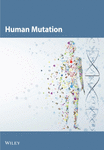Human vitamin K-dependent GAS6: Gene structure, allelic variation, and association with stroke†
Communicated by Edward Tuddenham
Abstract
The product of the growth arrest-specific gene 6 (GAS6), a ligand for the Axl, Sky, and Mer tyrosine kinase receptors, is a vitamin K-dependent protein, structurally related to anticoagulant protein S. Gas6-deficient mice are protected against thrombosis, demonstrating the importance of this protein in the cardiovascular system. The present study was aimed at determining the human GAS6 intron–exon structure and analyzing the gene for the presence of allelic variants that could be associated with atherothrombotic disease. Online analyses allowed us to localize 15 GAS6 exons and to determine the sequence of their intron-flanking regions, in a chromosome 13 region spanning 43.8 kb of DNA. SSCP analysis of PCR-amplified GAS6 exons with their intron-flanking regions from a minimum of 12 control DNA samples, revealed the presence of eight different variants, which were confirmed to be single nucleotide polymorphisms (SNPs). Three of them (c.1263G>C, c.1332C>T, and c.1869T>C) are localized in exons 11, 12, and 14, and appear to be neutral since they do not modify the encoded amino acid. The other SNPs (c.280+170C>G, c.712+26G>A, c.713–155C>T, c.834+7G>A, and c.1478–94C>G) are in introns 3, 7, 8, and 12. A preliminary analysis of five of these SNPs in a group of 110 healthy controls and 188 patients with atherothrombotic disease has revealed statistically significant differences between controls and stroke patients in the allelic distributions of one of these variants (c.834+7G>A in intron 8). The SNP identification in GAS6 reported here would be very useful in future association studies aimed at determining the physiologic role of GAS6 in stroke and other human diseases. Hum Mutat 23:506–512, 2004. © 2004 Wiley-Liss, Inc.




